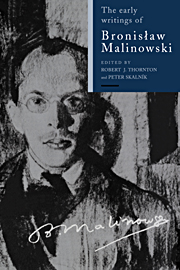Preface
Published online by Cambridge University Press: 18 December 2009
Summary
Nearly fifty years after his death, the work and ideas of Bronisław Malinowski continue to be central to the discipline of anthropology. Born and educated in Poland, his world-wide impact was so great during his lifetime that he has come to be thought of as one of the founders of modern, twentieth-century anthropology, and especially of British social anthropology. The careers of his many students continued to define social anthropology throughout the English-speaking world into the 1970s. Today, interest in his work has had a significant revival, especially in England, America and in his native Poland.
As recent commentators have begun to point out (e.g. Gellner 1985a; Buchowsky 1986; Kubica 1986), Malinowski's approach to myth, history, nationalism and ethnicity was rooted in a specifically Polish experience of history. His ideas are relevant today especially in Poland, Africa and in Melanesia and Mexico because the problems with which he concerned himself continue to exercise the best minds, and surface frequently in political and economic affairs. His constant attention to methodological matters speaks to today's similar concerns in all of the social sciences. Recent readers and critics of Malinowski have explored his style and the rhetorical methods he used in order to represent so vividly the world of the Trobriand Islanders (Clifford 1986; Geertz 1988; Thornton 1987), while others have commented with insight (but with considerable speculation) on his philosophical foundations (for example Leach 1957; Strenski 1982; Paluch 1981b). In the essays presented here, however, Malinowski's specific intellectual debts can be traced for the first time to Friedrich Nietzsche, Ernst Mach and James George Frazer, especially, but also to others such as Friedrich Herbart, Richard Avenarius, Edvard Westermarck, Karl Bücher and Emile Durkheim among many others.
- Type
- Chapter
- Information
- The Early Writings of Bronislaw Malinowski , pp. ix - xiiPublisher: Cambridge University PressPrint publication year: 1993



